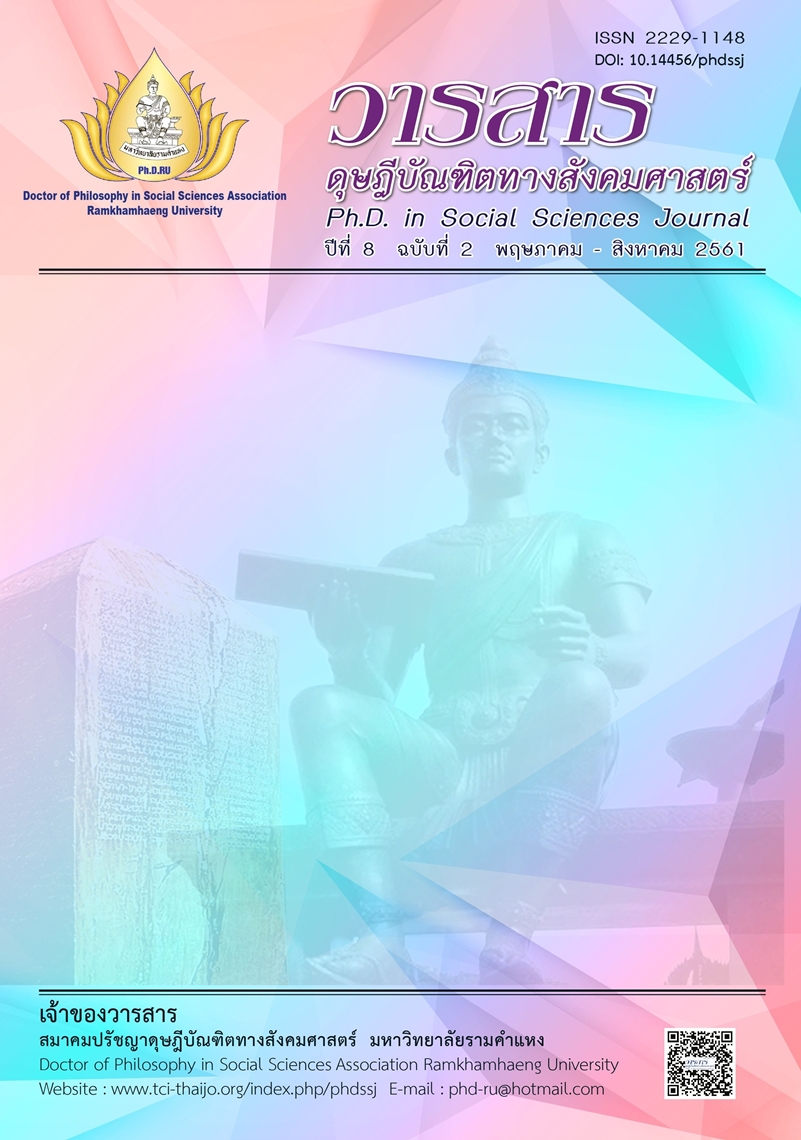THE EFFECTS OF THAI LEADERSHIP STYLE AND PROCEDURAL JUSTICE OF ORGANIZATIONS UNDER THAI CULTURAL MANAGEMENT ON ORGANIZATIONAL COMMITMENT
Main Article Content
Abstract
This research aimed to study Thai leadership style and procedural justice in Thai cultural management toward organizational commitment. To analyze the data for investigating the causal model we used the 550 employees’ questionnaire in the Thai cultural management organization. The component model consisted of an independent factor, the perception of Thai leadership, and organizational commitment was the dependent factor with a set of mediators: procedural justice, self-support, personality and the level of employee happiness.
The results showed that the average score of all factors was at a high level of perception while the fit index of our hypothesis model, Relative-fit, CFI, GFI, and RMSEA were 2.189, 99, 95 and 0.046 respectively. The interesting finding was that the personality factor was no significance to the level of employee happiness. This may be due to the fact that approximately 90% of the samples were operational staff who emphasized work rather than communication and personality.
Article Details
Academic articles, research articles, and book reviews in the Ph.D. in Social Sciences Journal are author’s opinions, and not the publisher’s, and is not the responsibility of the Ph.D. in Social Sciences Journal Philosophy Association, Ramkhamhaeng University. (In the case that research is done on human, the researcher has to be trained in Ethics for Doing Research on Human Training and has to produce the evidence of the training).
References
Becton, J. B., Giles, W. F., & Schraeder, M. (2008). Evaluating and rewarding OCBs: Potential consequences of formally incorporating organizational citizenship behavior in performance appraisal and reward systems. Employee Relations, 30(5), 494- 514.
Boonprasert, U. (2002). School-Based Management. Bangkok: Chulalongkorn University Press. [In Thai]
Burns, J. M. (1978). Leadership. New York: Harper & Row.
Chemers, M. M. (1997). An integrative theory of leadership. London: Lowrence Erlbaum Assiciates.
Chumworathayee, S., & Chongvisal, R. (2012). Leadership, interpersonal communication, organizational culture, and performance of supervisor in True Corporation Public Company Limited. Journal of Social Science & Human, 38(1), 199-213 [In Thai]
Cho, M. H., Shim, S. M., Lee, S. R., Mar, W., & Kim, G. H. (2005). Effect of evodiae fructus extracts on gene expressions related with alcohol metabolism and antioxidation in ethanol-loaded mice. Food Chem Toxicol, 43(9), 1365-1371.
Dalai Lama. (1999). Ethics for the new millennium. New York: Riverhead Books.
DuBrin, A. J. (2010). Principles of leadership. Mason, OH: South-Western Cengage Learning.
Fry, L. W. (2003). Toward a theory of spiritual leadership. The Leadership Quarterly, 14(6), 693-727.
Hellriegel, D., Slocum, Jr., J. W., & Woodman, R. W. (2001). Organizational behavior. Cincinnati, OH: South-Western College.
Herzberg, F., Mausner, B., & Snyderman, B. B. (1959). The motivation to work. New York: John Wiley & Sons.
Hofstede, G. (1980). Culture’s consequences: International differences in work-related values. Beverly Hills, CA: Sage.
Hofstede, G. (1983). The cultural relativity of organizational practices and theories. Journal of International Business Studies, 14(2), 75-89.
Hunt, J. G. (2004). What is leadership. In J. Antonakis, A. T. Cianciolo, & R. J. Sternberg (Eds.), The nature of leadership (pp.19-47). Thousand Oaks, CA: Sage.
Ingersoll, R. G. (1896). Great speeches of Col. R. G. Ingersoll (complet). Chicago: Rhodes & McClure.
Leithwood, K., & Jantzi, D. (1996). Toward an explanation of variation in teacher’s perceptions of transformational school leadership. Educational Administration Quarterly, 32(4), 512-538.
Likert, R. (1967). The human organization: Its management and value. New York: McGraw-Hill.
McFarland, R. D. (1979). Management: Foundation & practices (5th ed.). New York: Macmillan.
Meyer, J. P., & Allen, N. J. (1991). A three-component conceptualization of organizational commitment. Human Resource Management Review, 1(1), 61-89.
Min, H. (2007). Examining sources of warehouse employee turnover. International Journal of Physical Distribution & Logistics Management, 37(5), 375-388.
Mowday, R., Porter, L., & Steers, R. (1982). Employee organization linkages: The psychology of commitment, absenteeism, and turnover. New York: Academic Press.
Northouse, P. (2004). Leadership: Theory and practice (3rd ed.). Thousand Oaks, CA: Sage.
Organ, D., W. (1987). Organizational citizenship behavior: The good soldier syndrome. Middlesex County, MA: Lexinton.
Organ, D. W. (1997). Organizational citizenship behavior: It’s construct cleanup time. Human Performance, 10(2), 85-97.
Organ, D. W., Podsakoff, P. M., & MacKenzie, S. P. (2006). Organizational citizenship behavior: Its nature, antecedents, and consequences. London: Sage.
Prathampidok (Prayut Payutto). (1996). Education with Human Resources Development. Bangkok: Kansatsana Press. [In Thai]
Prathampidok (Prayut Payutto). (2000). A constitution for living (30th edition) Bangkok: Mahachulalongkornrajavidyalaya University Press. [In Thai]
Podsakoff, P. M., & MacKenzie, S. B. (1994). Organizational citizenship behaviors and sales unit effectiveness. Journal of Marketing Research, 3(1), 351-363.
Porter, L. W., & Steers, R. M. (1983). Organizational work, personnel factor in employee and absenteeism. Psychological Bulletin, 80(2), 151-179.
Powell, R. C. (2005). Resolute base. In M. Nuttall (Ed.). Encyclopedia of the Arctic (pp.1760-1761). New York: Routledge.
Smith, C. A., Organ, D. W., & Near, J. P. (1983). Organizational citizenship behavior: Its nature and antecedents. Journal of Applied Psychology, 68(4), 653-663.
Somdet Phra Nyanasamvara Suvaddhana, Somdet Phra Sangkharat, Sakalamahasanghaparinayaka. (2013). Buddhism and Thai society. Bangkok: Salapimpakarn. [In Thai]
Wattanasiritham, P. (1997). Thai leadership in the future: Leadership, importance to the future of Thailand. Bangkok: Pimthai. [In Thai]
Williams, L. J., & Anderson, S. E. (1991). Job satisfaction and organizational commitment as predictors of organizational citizenship and in-role behaviors. Journal of Management, 17(3), 601-617.

